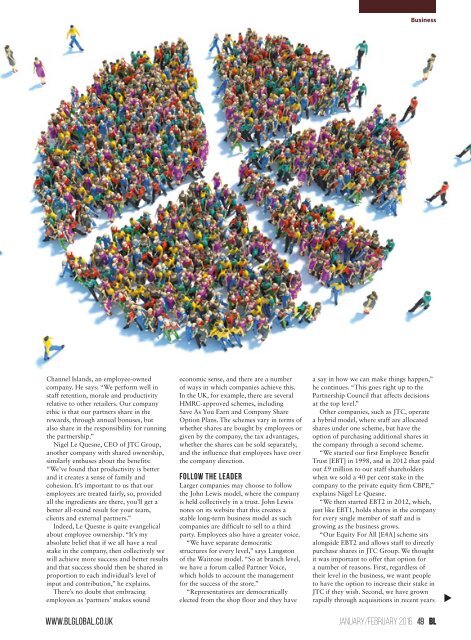BL Magazine
Create successful ePaper yourself
Turn your PDF publications into a flip-book with our unique Google optimized e-Paper software.
Business<br />
Channel Islands, an employee-owned<br />
company. He says: “We perform well in<br />
staff retention, morale and productivity<br />
relative to other retailers. Our company<br />
ethic is that our partners share in the<br />
rewards, through annual bonuses, but<br />
also share in the responsibility for running<br />
the partnership.”<br />
Nigel Le Quesne, CEO of JTC Group,<br />
another company with shared ownership,<br />
similarly enthuses about the benefits:<br />
“We’ve found that productivity is better<br />
and it creates a sense of family and<br />
cohesion. It’s important to us that our<br />
employees are treated fairly, so, provided<br />
all the ingredients are there, you’ll get a<br />
better all-round result for your team,<br />
clients and external partners.”<br />
Indeed, Le Quesne is quite evangelical<br />
about employee ownership. “It’s my<br />
absolute belief that if we all have a real<br />
stake in the company, then collectively we<br />
will achieve more success and better results<br />
and that success should then be shared in<br />
proportion to each individual’s level of<br />
input and contribution,” he explains.<br />
There’s no doubt that embracing<br />
employees as ‘partners’ makes sound<br />
economic sense, and there are a number<br />
of ways in which companies achieve this.<br />
In the UK, for example, there are several<br />
HMRC-approved schemes, including<br />
Save As You Earn and Company Share<br />
Option Plans. The schemes vary in terms of<br />
whether shares are bought by employees or<br />
given by the company, the tax advantages,<br />
whether the shares can be sold separately,<br />
and the influence that employees have over<br />
the company direction.<br />
FOLLOW THE LEADER<br />
Larger companies may choose to follow<br />
the John Lewis model, where the company<br />
is held collectively in a trust. John Lewis<br />
notes on its website that this creates a<br />
stable long-term business model as such<br />
companies are difficult to sell to a third<br />
party. Employees also have a greater voice.<br />
“We have separate democratic<br />
structures for every level,” says Langston<br />
of the Waitrose model. “So at branch level,<br />
we have a forum called Partner Voice,<br />
which holds to account the management<br />
for the success of the store.”<br />
“Representatives are democratically<br />
elected from the shop floor and they have<br />
a say in how we can make things happen,”<br />
he continues. “This goes right up to the<br />
Partnership Council that affects decisions<br />
at the top level.”<br />
Other companies, such as JTC, operate<br />
a hybrid model, where staff are allocated<br />
shares under one scheme, but have the<br />
option of purchasing additional shares in<br />
the company through a second scheme.<br />
“We started our first Employee Benefit<br />
Trust [EBT] in 1998, and in 2012 that paid<br />
out £9 million to our staff shareholders<br />
when we sold a 40 per cent stake in the<br />
company to the private equity firm CBPE,”<br />
explains Nigel Le Quesne.<br />
“We then started EBT2 in 2012, which,<br />
just like EBT1, holds shares in the company<br />
for every single member of staff and is<br />
growing as the business grows.<br />
“Our Equity For All [E4A] scheme sits<br />
alongside EBT2 and allows staff to directly<br />
purchase shares in JTC Group. We thought<br />
it was important to offer that option for<br />
a number of reasons. First, regardless of<br />
their level in the business, we want people<br />
to have the option to increase their stake in<br />
JTC if they wish. Second, we have grown<br />
rapidly through acquisitions in recent years<br />
▼<br />
www.blglobal.co.uk january/february 2016 49

















